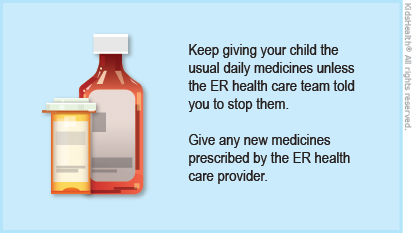A fever can be a sign of a serious infection in kids with sickle cell disease. The ER care team didn't find a serious infection, so your child can now go home. Follow these instructions to care for your child.



Your child:
The specialist knows your child's health better than any other doctor. So it's always best to call your hematology doctor when there's a problem.

Your child:
When you call 911, tell emergency responders that your child has sickle cell disease.

Why is fever a problem for kids with sickle cell disease? A fever can be an early warning sign of an infection or other problem like acute chest syndrome.
Kids with sickle cell disease are more likely to get infections in their blood and other places, mostly because the sickle cells damage the spleen over time. The spleen's job is to filter out germs from the blood that cause infection. When it's damaged, it can't do that properly.
What will health care providers in the ER do? When kids with sickle cell disease and a fever come to the ER, the health care team will ask questions and do a careful exam and some blood tests. They'll give the child antibiotics before the test results come back, in case there's an infection with bacteria (a type of germ). Unless they think there's a serious medical problem, the team will send the child home from the ER.
Some blood tests take several days in the lab. There's a small chance that a blood test will later show bacteria after a child has gone home from the ER. If this happens, the health care team will contact the family to ask them to bring the child back to the ER to be checked again. So after an ER visit, make sure to answer calls or return messages from the ER. It could be about lab updates that are important to take care of right away.